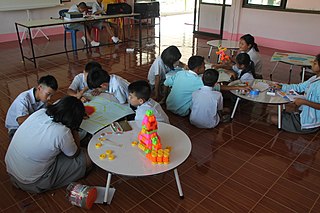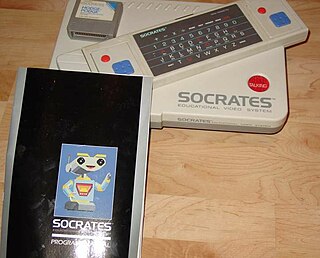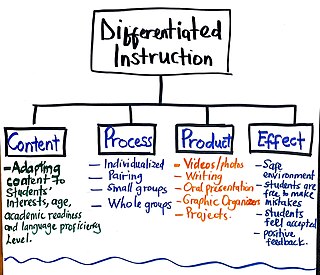Educational games are games explicitly designed with educational purposes, or which have incidental or secondary educational value. All types of games may be used in an educational environment, however educational games are games that are designed to help people learn about certain subjects, expand concepts, reinforce development, understand a historical event or culture, or assist them in learning a skill as they play. Game types include board, card, and video games.
Situated learning is a theory that explains an individual's acquisition of professional skills and includes research on apprenticeship into how legitimate peripheral participation leads to membership in a community of practice. Situated learning "takes as its focus the relationship between learning and the social situation in which it occurs".

Problem-based learning (PBL) is a student-centered pedagogy in which students learn about a subject through the experience of solving an open-ended problem found in trigger material. The PBL process does not focus on problem solving with a defined solution, but it allows for the development of other desirable skills and attributes. This includes knowledge acquisition, enhanced group collaboration and communication.

Student-centered learning, also known as learner-centered education, broadly encompasses methods of teaching that shift the focus of instruction from the teacher to the student. In original usage, student-centered learning aims to develop learner autonomy and independence by putting responsibility for the learning path in the hands of students by imparting to them skills, and the basis on how to learn a specific subject and schemata required to measure up to the specific performance requirement. Student-centered instruction focuses on skills and practices that enable lifelong learning and independent problem-solving. Student-centered learning theory and practice are based on the constructivist learning theory that emphasizes the learner's critical role in constructing meaning from new information and prior experience.

Project-based learning (PBL) is a student-centered pedagogy that involves a dynamic classroom approach in which it is believed that students acquire a deeper knowledge through active exploration of real-world challenges and problems. Students learn about a subject by working for an extended period of time to investigate and respond to a complex question, challenge, or problem. It is a style of active learning and inquiry-based learning. PBL contrasts with paper-based, rote memorization, or teacher-led instruction that presents established facts or portrays a smooth path to knowledge by instead posing questions, problems or scenarios.
Educational technology is the combined use of computer hardware, software, and educational theory and practice to facilitate learning. When referred to with its abbreviation, edtech, it is often referring to the industry of companies that create educational technology.
Technology integration is the use of technology tools in general content areas in education in order to allow students to apply computer and technology skills to learning and problem-solving. Generally speaking, the curriculum drives the use of technology and not vice versa. Technology integration is defined as the use of technology to enhance and support the educational environment. Technology integration in the classroom can also support classroom instruction by creating opportunities for students to complete assignments on the computer rather than with normal pencil and paper. In a larger sense, technology integration can also refer to the use of an integration platform and APIs in the management of a school, to integrate disparate SaaS applications, databases, and programs used by an educational institution so that their data can be shared in real-time across all systems on campus, thus supporting students' education by improving data quality and access for faculty and staff.
"Curriculum integration with the use of technology involves the infusion of technology as a tool to enhance the learning in a content area or multidisciplinary setting... Effective integration of technology is achieved when students are able to select technology tools to help them obtain information in a timely manner, analyze and synthesize the information, and present it professionally to an authentic audience. The technology should become an integral part of how the classroom functions—as accessible as all other classroom tools. The focus in each lesson or unit is the curriculum outcome, not the technology."
Informal education is a general term for education that can occur outside of a structured curriculum. Informal education encompasses student interests within a curriculum in a regular classroom, but is not limited to that setting. It works through conversation, and the exploration and enlargement of experience. Sometimes there is a clear objective link to some broader plan, but not always. The goal is to provide learners with the tools they needs to eventually reach more complex material. It can refer to various forms of alternative education, such as unschooling or homeschooling, autodidacticism (self-teaching), and youth work.

An educational video game is a video game that provides learning or training value to the player. Edutainment describes an intentional merger of video games and educational software into a single product. In the narrower sense used here, the term describes educational software which is primarily about entertainment, but tends to educate as well and sells itself partly under the educational umbrella. Normally software of this kind is not structured towards school curricula and does not involve educational advisors.

Blue Bells Model School is a co-educational English medium school affiliated to CBSE Board, located in the city of Gurgaon, Haryana, India. Founded in the year in 1980 the School was affiliated to CBSE in 1986 till class X. Later, in 1991, the school was further upgraded to enroll students in class XII. The apex body of the school is D.R. Memorial Bal Shiksha Vikas Society.
The National Curriculum Framework 2005 is the fourth National Curriculum Framework published in 2005 by the National Council of Educational Research and Training (NCERT) in India. Its predecessors were published in 1975, 1988, 2000.

Differentiated instruction and assessment, also known as differentiated learning or, in education, simply, differentiation, is a framework or philosophy for effective teaching that involves providing all students within their diverse classroom community of learners a range of different avenues for understanding new information in terms of: acquiring content; processing, constructing, or making sense of ideas; and developing teaching materials and assessment measures so that all students within a classroom can learn effectively, regardless of differences in their ability. Differentiated instruction, according to Carol Ann Tomlinson, is the process of "ensuring that what a student learns, how he or she learns it, and how the student demonstrates what he or she has learned is a match for that student's readiness level, interests, and preferred mode of learning." According to Boelens et al. (2018), differentiation can be on two different levels: the administration level and the classroom level. The administration level takes the socioeconomic status and gender of students into consideration. At the classroom level, differentiation revolves around content, processing, product, and effects. On the content level, teachers adapt what they are teaching to meet the needs of students. This can mean making content more challenging or simplified for students based on their levels. The process of learning can be differentiated as well. Teachers may choose to teach individually at a time, assign problems to small groups, partners or the whole group depending on the needs of the students. By differentiating product, teachers decide how students will present what they have learned. This may take the form of videos, graphic organizers, photo presentations, writing, and oral presentations. All these take place in a safe classroom environment where students feel respected and valued—effects.
Vishwajyot High School also known as 'VJHS', is a private Co-ed school in Kharghar, Navi Mumbai, Maharashtra, India.

Gurugram Public School is a K-12 school located in Sector 55 and Sector 62 Gurgaon.
Global citizenship education (GCED) is a form of civic learning that involves students' active participation in projects that address global issues of a social, political, economic, or environmental nature. The two main elements of GCE are 'global consciousness'; the moral or ethical aspect of global issues, and 'global competencies', or skills meant to enable learners to participate in changing and developing the world. The promotion of GCE was a response by governments and NGOs to the emergence of supranational institution, regional economic blocs, and the development of information and communications technologies. These have all resulted in the emergence of a more globally oriented and collaborative approach to education. GCE addresses themes such as peace and human rights, intercultural understanding, citizenship education, respect for diversity and tolerance, and inclusiveness.
In U.S. education, deeper learning is a set of student educational outcomes including acquisition of robust core academic content, higher-order thinking skills, and learning dispositions. Deeper learning is based on the premise that the nature of work, civic, and everyday life is changing and therefore increasingly requires that formal education provides young people with mastery of skills like analytic reasoning, complex problem solving, and teamwork.

The term learning environment can refer to an educational approach, cultural context, or physical setting in which teaching and learning occur. The term is commonly used as a more definitive alternative to "classroom", but it typically refers to the context of educational philosophy or knowledge experienced by the student and may also encompass a variety of learning cultures—its presiding ethos and characteristics, how individuals interact, governing structures, and philosophy. In a societal sense, learning environment may refer to the culture of the population it serves and of their location. Learning environments are highly diverse in use, learning styles, organization, and educational institution. The culture and context of a place or organization includes such factors as a way of thinking, behaving, or working, also known as organizational culture. For a learning environment such as an educational institution, it also includes such factors as operational characteristics of the instructors, instructional group, or institution; the philosophy or knowledge experienced by the student and may also encompass a variety of learning cultures—its presiding ethos and characteristics, how individuals interact, governing structures, and philosophy in learning styles and pedagogies used; and the societal culture of where the learning is occurring. Although physical environments do not determine educational activities, there is evidence of a relationship between school settings and the activities that take place there.
Curricula in early childhood care and education (ECCE) address the role and importance of curricula in the education of young children, and is the driving force behind any ECCE programme. It is ‘an integral part of the engine that, together with the energy and motivation of staff, provides the momentum that makes programmes live’. It follows therefore that the quality of a programme is greatly influenced by the quality of its curriculum. In early childhood, these may be programmes for children or parents, including health and nutrition interventions and prenatal programmes, as well as centre-based programmes for children.
Indus Trust is a non profit educational trust that focuses on training research and allied activities for underprivileged communities in India.
Education for justice is the process of promoting a culture of lawfulness through educational activities at all levels. Education for justice aims at teaching the next generation about crime prevention, and to better understand and address problems that can undermine the rule of law. It promotes peace and encourages students to actively engage in their communities and future professions. Education for Justice is a basic legal knowledge, in which educational activities at all levels seek to promote understanding of crime prevention, peace, justice, human rights, and problems that can undermine the rule of law. Education reportedly plays a key role in transmitting and sustaining socio-cultural norms and ensuring their continued evolution. As such, governments may seek to strengthen this promotion of a culture of lawfulness through education.









